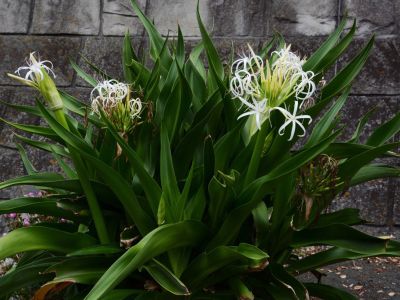Crinum lily pup division is the technique most growers use to propagate and produce new plants. Propagating crinum lilies is the best way to get more of the large and hardy plants. Learning more about dividing crinum lilies can help gardeners maintain the health of established plantings and add more plants to the garden at no additional cost.
Getting More Plants from Crinum Lily Pups
The crinum lily is a member of the Amaryllis family and produces a bulbil, growing on the stem at the base where the flower sprouted. The weight of the bulbils will eventually bring down the stem (scape) that’s holding it. Sometimes, several offsets develop from the same flower. Keep the soil moist after the scapes drop. After a week or so, leaves and roots will develop, and the bulbils continue to grow. Remove fallen offsets to grow more plants. Be sure to include the roots. Repot into a container that is large enough to allow for growth. You can also plant directly into the ground.
When to Separate Crinum Lily Pups
In most gardens, plants will remain green throughout the year. This makes it difficult to determine the best time for dividing crinum lilies (digging and division in early autumn is suggested). Generally, crinum lily pup division is done during the plant’s slowest growth period. Divisions should not be made while the plant is actively in bloom. While deciding when to separate crinum lily pups is up to the gardener, it should be noted that these plants do not like to have their roots disturbed. Therefore, plant division should only be done on an as needed basis. Have planting holes prepared so you can plant new bulbs into them immediately. If the area is dry, water a few days ahead or dig a few days after a rain. Don’t dig when the soil is wet, but when slightly damp it makes it easier.
How to Divide Crinum Lilies
Before separating crinum lilies and pups, you will need a quality pair of gloves and sharp garden tools. Gloves will be especially important to those with sensitive skin, as the plant does contain toxins which may cause irritation. Dig in a wide circle around the established crinum, about 2 feet (61 cm.) down. Gently lift the plant from the ground and be certain to remove as much soil from the plant as possible. Break stalks apart, taking roots and bulbs with them or separate to single bulbs by cutting apart. Plant bulbs into prepared holes, as neither the mother plant nor the pups should be allowed to completely dry before being moved to their new location. If bulbs are more than 6 inches (15 cm.), you may split them into halves or quarters. Treat with fungicide and plant one third of the cut bulb with the basil plate downward and keep moist. Regular irrigation through the first transplant season will be essential to reestablishment of the planting. After several weeks, bulbils will grow, which you may also plant if desired. Learning how to divide crinum lilies is faster than growing from seed, by several years. Regardless of size, a newly divided crinum plant will not bloom the first year. You will get more of the striking blooms, however, within two to three years.
